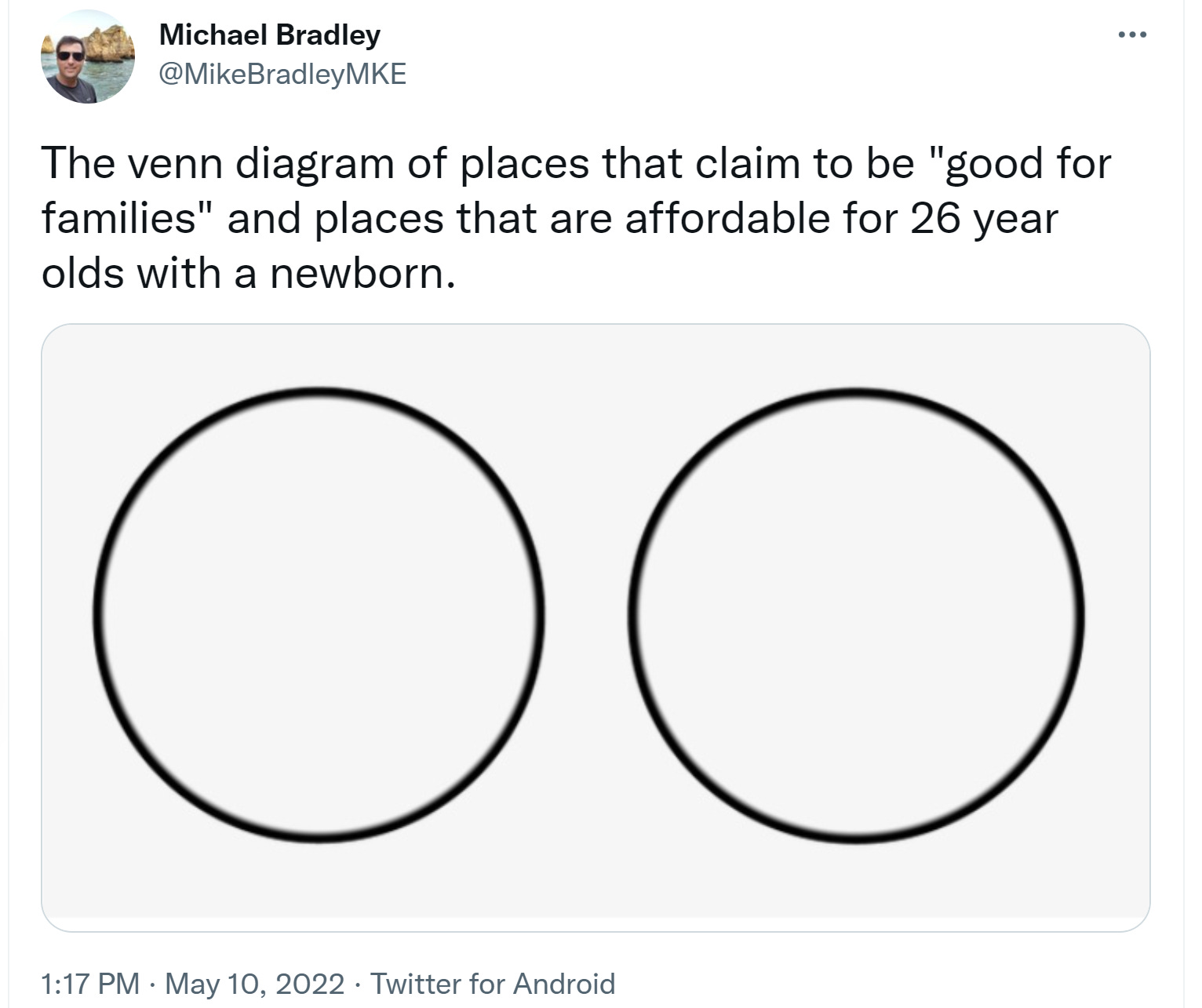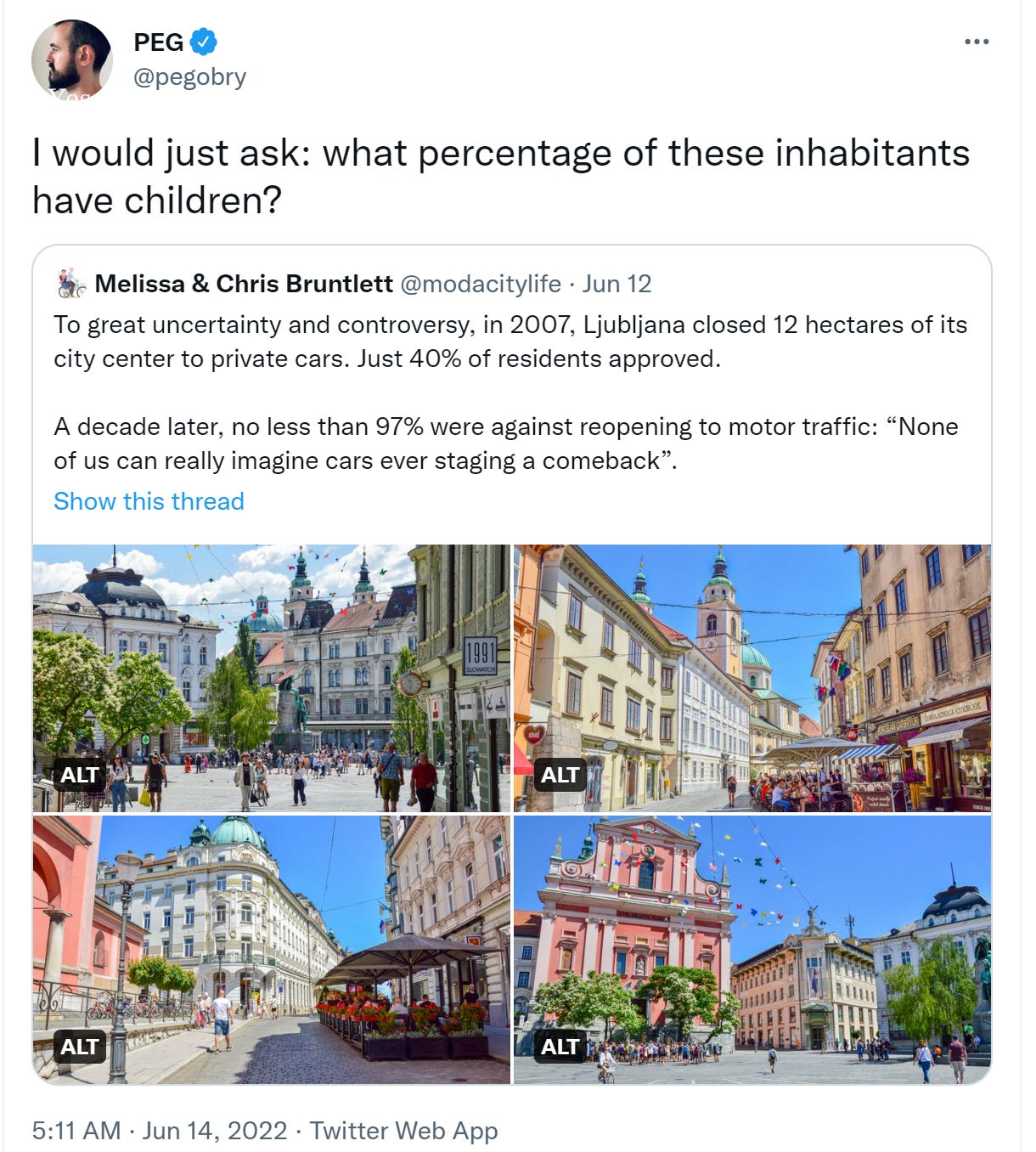The Deleted Scenes - More on Pro-Family Urbanism
I saw this recently on Twitter: Yes. This is a point that is lost on a lot of conservatives, who think of being pro-family merely as being anti-abortion, or as a sort of nice abstraction. At best, they have the idea that “nice” neighborhoods should be preserved as prizes for young families to earn after years of hard work. But where they’re actually supposed to live in between is left unstated. “Somewhere else” is not a place. You see this when we talk about opening up zoning. Many people feel that upzoning single-family areas makes homeownership unaffordable. What they see is (often fairly modest) houses being replaced with multifamily buildings, many of whose units will be for rent rather than for sale. But in the areas where this transition is actually happening or under discussion, those modest houses are already unaffordable for most people. That’s why upzoning is on the table in the first place; the prices are already high enough to support it. You can’t keep single-family neighborhoods around via regulation and ensure that the prices will be within reach for the average middle-class family. This is something conservatives understand in most other contexts. I also recently saw this, from a conservative with some credibility and name recognition in the right-of-center sphere. In other words, not a kook: First of all, based on what my wife and I saw in Croatia, quite a lot of families with kids live in places like this. Some parts of European cities are car-free because of deliberate choices like this; many are car-free simply because the narrow, winding streets predate the automobile, sometimes by many centuries. I’ve worked through this sort of thing a lot here: I have some thoughts on “being more like Europe” here; here I argue that traditional urbanism is very much a part of American built history; and here I think about suburbia, the public realm, and trading some private amenities for more public goods. The idea that favoring traditional, walkable cities over suburbia is some kind of ideological or political signifier is simply an error, in my view. Maybe it’s true that big cities lean left for some reason inherent in them, but even if it is, Europe and America alike are absolutely full of towns and villages that are culturally conservative but traditionally urban. That’s because virtually every settlement was traditionally urban before 1930-1950. Back to that question: do people in these car-free cities have kids? Many do, but for the sake of argument, let’s say they’re young and they don’t. Some, of course, will in a few years. Maybe they’ll move away then. Even if, in some way, these places are hostile to families, they still provide a crucial bridge between leaving your parents’ house or graduating college at 18, and getting married and having kids in your late 20s or early 30s. Or even your mid-20s. Taking away housing options for single or childless people does not make it easier to get married and have kids. It makes it harder, because you’re squeezing those people in their pre-kid years. People marry and have kids later than they used to, like it or not. Observing that a lot of the people in hip urban neighborhoods are childless is effectively the same thing as observing that they’re young. But in any case, cities are not hostile to families, as any number of families in urban settings, or in suburban settings and trying to rely less on the car, will tell you. Look, I suppose a lot of this comes down to what you’re used to. If you grew up in the suburbs, and if you were corralled into a car every time you went anywhere, and if you’re used to corralling your kids into a car, it’s fine. It works. If you’re used to doing it differently, you’re used to doing it differently. Freighting these choices with political meaning is a big, big mistake. The other day, on the walking trails in Reston, Virginia, I saw a mother and her two young children open the gate to their backyard fence, step onto the walking trail, and head towards the public pool a few hundred feet away, carrying towels. What a frictionless, almost effortless thing—so much easier than shooing two kids into a car, especially if the two kids are young enough to still need to be buckled into a children’s carseat. In my state of Virginia, that applies to children seven years and younger. That routine of getting everyone into the car is effort; it’s friction. It wears you down. It raises the cost of having kids, even if, given America’s predominant land use, it also lowers it. When the average 20-something imagines having kids, they don’t imagine walking them out the door and over to school, or the pool, or the store. They imagine the drudgery of buckling them into the minivan, sitting in the drop-off and pick-up line at school, spending 20 minutes to leave the house to drive five minutes to buy a gallon of milk. Walkable communities, or at least walkable developments of the sort now in vogue, can be an absolute godsend for young parents, if they can afford those places. I touched on this in a photo essay on Rockville, Maryland, a major D.C. suburb:
None of these are observations I would have been able to explicitly make before I began to consider myself an urbanist, sort of like how I never liked traffic noise but was also never able to articulate that dislike specifically. Let me go back to a sentence up above: “It raises the cost of having kids, even if, given America’s predominant land use, it also lowers it.” I think that’s important. In other words, car-dependent suburbia is a serviceable and familiar answer to a substandard way of thinking about the built environment. It works in the here and now, for some people, even as it compounds many of our problems over the long term. So much of what animates my work here is looking at all of this stuff as a right-leaning layperson. Pro-family is as pro-family does. This is not ideological. It’s about whether there’s a superior alternative to the minivan-carseat corral and the drive for every errand, task, and grocery store run. There is. Don’t dismiss it because young singles like it too. Lots of different people like it because there’s something human about it. The fact that you can arrive at urbanist and pro-housing conclusions from lots of different political avenues suggests to me that the underlying positions are sound. This turned out a lot longer than I expected! Leave a comment, send an email. I’m curious how this hits you, and where on the political spectrum you are. Related Reading: Housing and Pro-Family Conservatism Thanks for reading! Please consider upgrading to a paid subscription to help support this newsletter. You’ll get a weekend subscribers-only post, plus full access to the archive of over 300 posts and growing—more than one full year! And you’ll help ensure more material like this! You’re a free subscriber to The Deleted Scenes. For the full experience, become a paid subscriber. |
Older messages
All You Can Drive
Tuesday, June 21, 2022
What Do You Think You're Looking At? #63
A Peek at What's Possible
Monday, June 20, 2022
A small home business in Rovinj, Croatia
The Wolverine Claws
Saturday, June 18, 2022
Or making the right thing easy to do
New and Old #62
Friday, June 17, 2022
Friday roundup and commentary
New Toy, New Ride
Friday, June 17, 2022
What Do You Think You're Looking At? #62
You Might Also Like
Dads, You Can Get in the Best Shape of Your Life With This Workout Program
Monday, March 10, 2025
View in Browser Men's Health SHOP MVP EXCLUSIVES SUBSCRIBE Dads, You Can Get in the Best Shape of Your Life With This Workout Program Dads, You Can Get in the Best Shape of Your Life With This
Meghann Fahy’s Master Plan
Monday, March 10, 2025
Today in style, self, culture, and power. The Cut March 10, 2025 CUT COVERS Meghann Fahy's Master Plan After breaking out on TV, Fahy stars in a big-screen thriller this April. She won't
EmRata Flaunted Pelvic Bone Cleavage, Aka "Pelvage," In The Tiniest Skirt
Monday, March 10, 2025
Plus, your love life this week, your daily horoscope, and more. Mar. 10, 2025 Bustle Daily Chet Hanks EXCLUSIVE Chet Hanks Has The Last Laugh It's easy to make assumptions about Chet Hanks, namely
The 20 best cookbooks of spring
Monday, March 10, 2025
NYC steakhouse sues Texas over attempted “Texts Strip” rebranding.
(sorry)
Monday, March 10, 2025
now with the link this time ͏ ͏ ͏ ͏ ͏ ͏ ͏ ͏ ͏ ͏ ͏ ͏ ͏ ͏ ͏ ͏ ͏ ͏ ͏ ͏ ͏ ͏ ͏ ͏ ͏ ͏ ͏ ͏ ͏ ͏ ͏ ͏ ͏ ͏ ͏ ͏ ͏ ͏ ͏ ͏ ͏ ͏ ͏ ͏ ͏ ͏ ͏ ͏ ͏ ͏ ͏ ͏ ͏ ͏ ͏ ͏ ͏ ͏ ͏ ͏ ͏ ͏ ͏ ͏ ͏ ͏ ͏ ͏ ͏ ͏ ͏ ͏ ͏ ͏ ͏ ͏ ͏ ͏ ͏ ͏ ͏ ͏ ͏ ͏ ͏ ͏ ͏
an equinox stretch
Monday, March 10, 2025
everything you need for Wednesday's workshop ͏ ͏ ͏ ͏ ͏ ͏ ͏ ͏ ͏ ͏ ͏ ͏ ͏ ͏ ͏ ͏ ͏ ͏ ͏ ͏ ͏ ͏ ͏ ͏ ͏ ͏ ͏ ͏ ͏ ͏ ͏ ͏ ͏ ͏ ͏ ͏ ͏ ͏ ͏ ͏ ͏ ͏ ͏ ͏ ͏ ͏ ͏ ͏ ͏ ͏ ͏ ͏ ͏ ͏ ͏ ͏ ͏ ͏ ͏ ͏ ͏ ͏ ͏ ͏ ͏ ͏ ͏ ͏ ͏ ͏ ͏ ͏ ͏ ͏ ͏ ͏
9 Strange Tax Deductions You Might Actually Qualify For
Monday, March 10, 2025
Easiest Ways to Spot an Unpaid Tolls Scam Text. Good news: The IRS might allow you to deduct all those gambling losses. Not displaying correctly? View this newsletter online. TODAY'S FEATURED STORY
Maybe You Fund The People Who *Will Start* Families
Monday, March 10, 2025
At best, the DOT's new funding priorities get causation wrong ͏ ͏ ͏ ͏ ͏ ͏ ͏ ͏ ͏ ͏ ͏ ͏ ͏ ͏ ͏ ͏ ͏ ͏ ͏ ͏ ͏ ͏ ͏ ͏ ͏ ͏ ͏ ͏ ͏ ͏ ͏ ͏ ͏ ͏ ͏ ͏ ͏ ͏ ͏ ͏ ͏ ͏ ͏ ͏ ͏ ͏ ͏ ͏ ͏ ͏ ͏ ͏ ͏ ͏ ͏ ͏ ͏ ͏ ͏ ͏ ͏ ͏ ͏ ͏ ͏ ͏ ͏ ͏
“In this Poem, We Will Not Glorify Sunrise” by Sarah Freligh
Monday, March 10, 2025
nor admire the apples that blossom / during a February heat wave ͏ ͏ ͏ ͏ ͏ ͏ ͏ ͏ ͏ ͏ ͏ ͏ ͏ ͏ ͏ ͏ ͏ ͏ ͏ ͏ ͏ ͏ ͏ ͏ ͏ ͏ ͏ ͏ ͏ ͏ ͏ ͏ ͏ ͏
Glen Powell to the (couture) rescue
Monday, March 10, 2025
— Check out what we Skimm'd for you today March 10, 2025 Subscribe Read in browser But first: our editors' cult-status products Update location or View forecast Good morning. While we might

